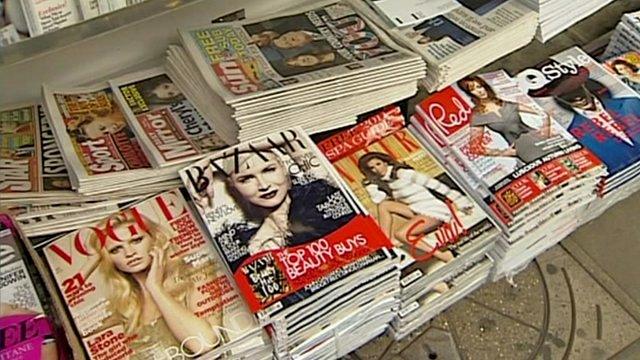The BBC reporters who strip off to host The Naked Podcast
- Published
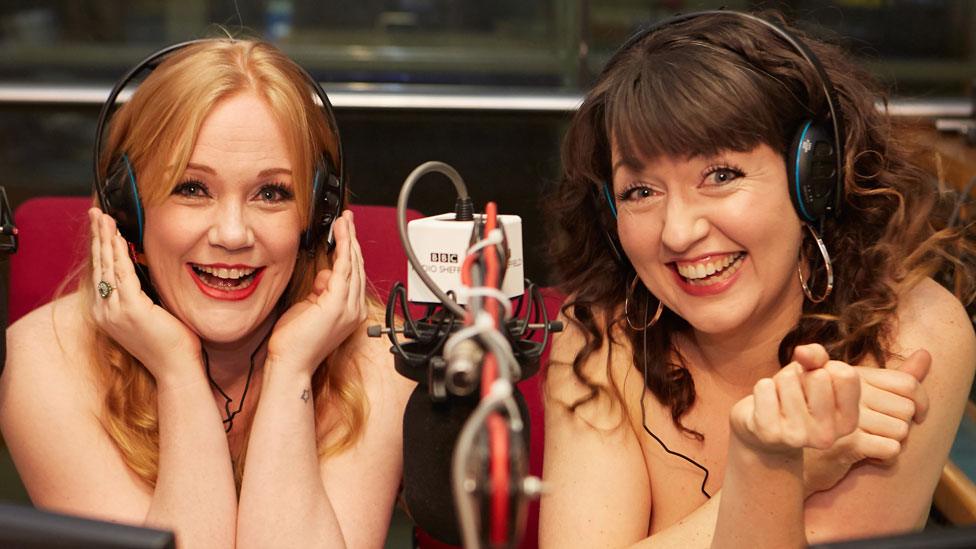
Best buddies in the buff: Jenny Eells and Kat Harbourne
"It's awkward, it's embarrassing but everyone is on the same level - we do it in bathrobes," laugh the women behind The Naked Podcast, Jenny Eells and Kat Harbourne.
The bathrobes aren't on for long though - they strip off with their interviewee just before the conversation begins.
The question, of course, is why?
"When Kat came up with the idea, I forced her to do it. I thought it was brilliant and bold being naked," says Jenny.
"I guess we wanted to see if, without clothing, do people literally reveal all? Do people speak more openly?
"From the ladies we've spoken to, they absolutely, most definitely do."
Jenny chips in: "People have been so open and totally honest - that is what flabbergasted me. It's caught my breath, it's been actually quite emotional in that respect."
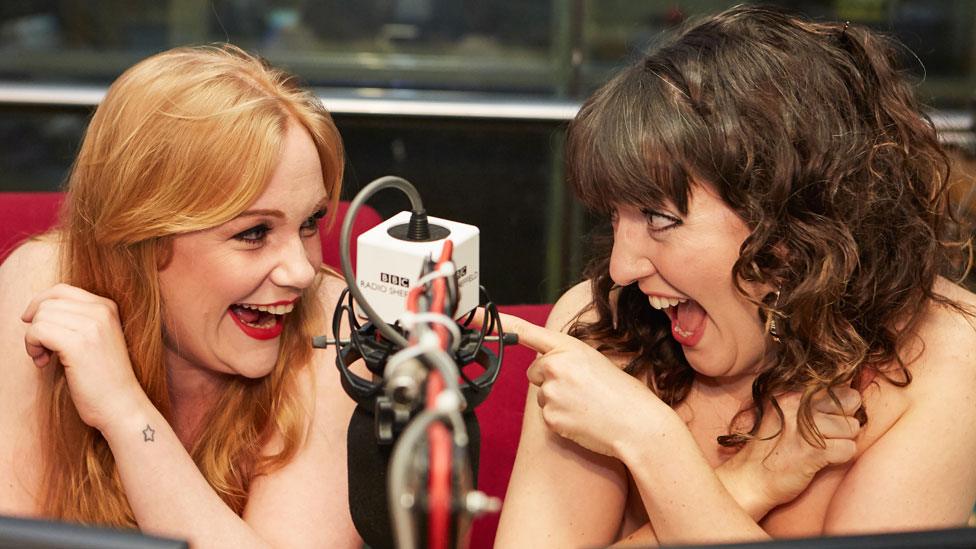
They promise "frank, funny and fearless conversations"
The daring duo were keen to explore issues surrounding body image and nudity for their podcast, which is released by BBC Radio Sheffield, where they are both reporters.
There will be 10 episodes in the series, and Radio Sheffield is running a number of stories about body image and identity this week to tie in.
Kat says the podcast was personal for her. "For me, one of the things was that we're both now in our 30s, and women especially spend a long time wanting to change their bodies, to get thinner, to get fitter, to get a better tan, to have curly hair or straight hair," she says.
"It struck me what a massive waste of time this was.
"If I look back at a photo of myself years ago, I think, 'Wow, I looked brilliant.' But at the time, I thought I looked fat or ugly or not quite right.
"Imagine if we spoke to ordinary women about ordinary struggles, to see if somehow we can break the cycle of negative self image, not just for ourselves but for other women?"
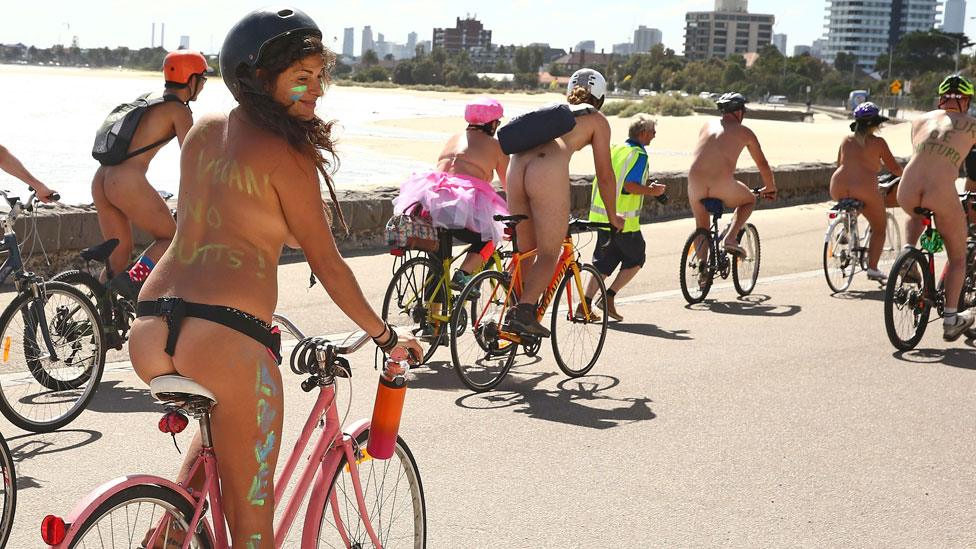
The World Naked Bike Ride sees cyclists in Australia peacefully protest issues including body image
They admit getting naked for an interview "isn't everybody's cup of tea". But then "you relax a bit and there's a real trust, because to get naked with someone is quite a big deal".
But it didn't deter their guests, who include a life model, a self-proclaimed "poo lady" with inflammatory bowel disease and an ostomy bag, and a Muslim woman who said the first naked person she saw was her husband, after they got married.
"A lot of the stories we heard we only found out because we did the podcast," adds Kat.
'Hilarious moments'
Getting naked isn't a new gimmick though, and it's been done for TV shows and films including Naked Attraction, How to Look Good Naked and The Full Monty.
"They're all great but they treat nudity as a shock tactic, to get you scrutinising other people's bodies," says Kat, who says their podcast conversations are about "empowerment" and "it's audio only, so you're not distracted by what you're looking at - it's very intimate".
One of the saddest things to emerge from the podcasts was "how many of the women were down on themselves and their bodies," she says.
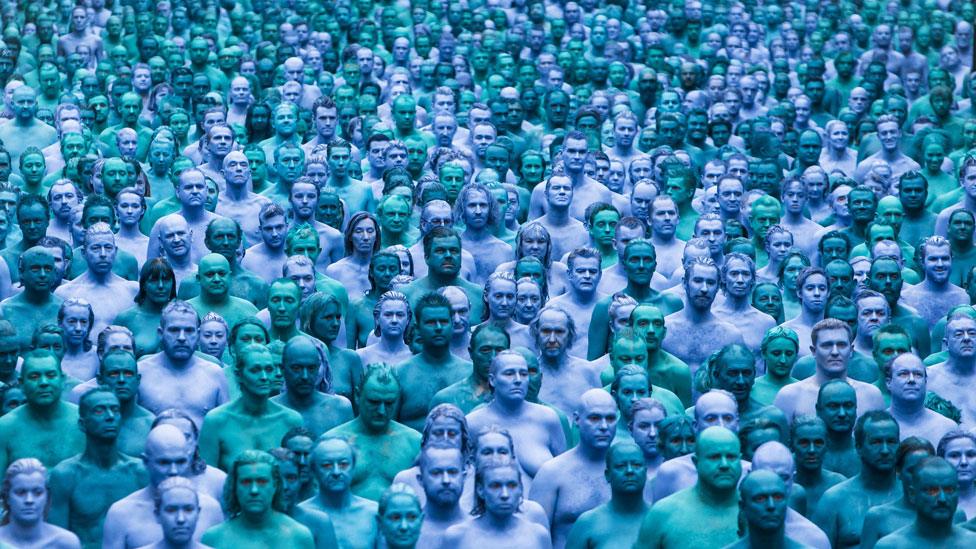
Safety in numbers: Hundreds of people wore just blue paint for artist Spencer Tunick in 2016
"It really surprised me - I thought, 'we're sitting with strong, powerful intelligent, funny women' but I heard just how many negative things they've said to themselves.
"And the fact that we we all do that, that was really sad for me."
Jenny is quick to add that there were some "hilarious" moments too, including them asking the women what name they gave to their "bits" when they were younger.
"One of the funniest was 'foof'," she says with a roar of laughter.
They also asked a former Miss Sheffield in her late 20s how she felt about her body, with Jenny revealing: "She absolutely loves the idea of her fake breasts."
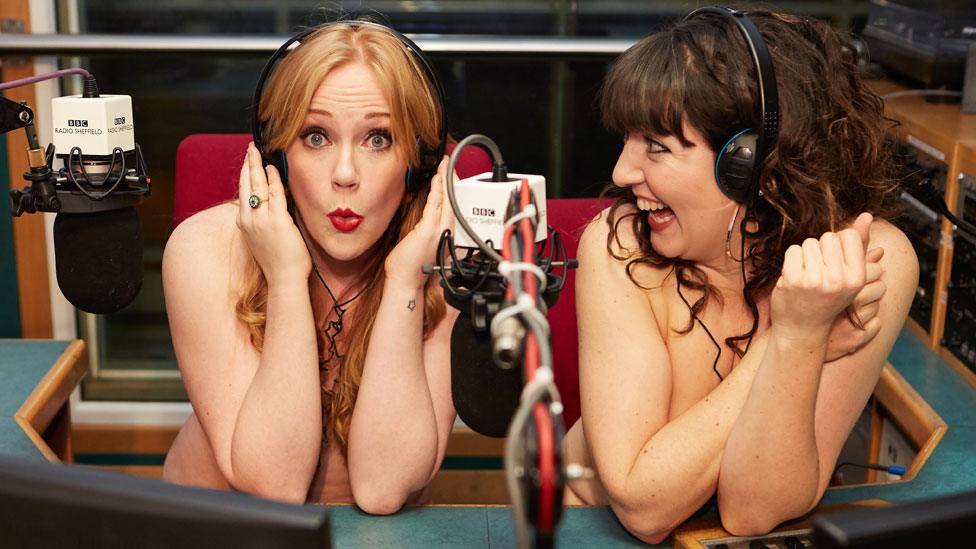
They pair say they are now much happier in their own skins
But one serious issue to continually emerge was the impact parents can have on their children's body image.
"A number of women we spoke to talked about the impact of their mums being on diets, staring in the mirror saying 'I'm fat today' and 'I need to lose weight' - they grew up thinking that's what women did," says Kat.
Jenny adds: "One lady said the fact her mum was constantly on a diet shaped how she felt about her body growing up, and acceptance of how she looked."
Diets and body confidence come up quite a lot during the podcasts.
One interviewee, Julia, spoke about her weight going up and down her whole life.
'Her mum slapped her'
"Her weight started creeping up and up and she hit 15 stone and said 'This is a man's weight, this is strong, it's ok for me to be a man's weight'," says Kat.
"At that moment she accepted her body for what it is - an amazing powerhouse of womanhood."
Isma, who grew up in a Muslim household, recalled finding sex education lessons at school difficult "as she had to imagine your parents having sex".
"Afterwards a school friend told her not to worry, saying 'that's how white people do it, that's not how Muslim people do it, when we have sex, babies are a gift from God'.
"At that point, she was like 'oh well, phew'", Jenny adds, saying Isma obviously found out what really happened once she was married.
Kat speaks movingly about life drawing model Alison, who was one of their guests and who talked about growing up in a strict religious household, where subjects like sex were never discussed.
"She came downstairs as a child to tell her mum she'd started her period, and her mum slapped her, saying, 'We don't talk about things like that'."
Alison didn't get an apology until many years later, when her mother was on her deathbed.
"Afterwards, Alison said, 'I hadn't thought about that in so long.' It came back to her in our conversation," Jenny adds.
These revealing chats take place either in Jenny or Kat's homes, or somewhere the interviewees find comfortable, such as in an art studio for Alison.
"Every woman has said, within five minutes of us talking 'you forget you're naked'," laughs Jenny, adding that everyone said they found the experience incredibly "positive".
And for Jenny and Kat, it has been life-changing.
"We started this about a year ago, and I now feel about 100% better about my own body from doing this," says Jenny.
Kat has been transformed by the experience, saying "I feel 300% or 1,000% better". It was "really hard" stripping off, but she feels "so strong and happy and powerful".
'Waste of time thinking we're fat'
"One of the reasons for doing the podcast is my mum had Huntington's disease and died when she was 54. It's a genetic condition and I've got a 50% chance of getting it. I've not had the test," she says.
"It makes you think - nobody knows what is to come in the future and we could walk outside and be hit by a bus. Anything can happen.
"It's such a waste of time thinking we're fat when actually our bodies are in perfect working order.
"Now I get home and stand in front of the mirror naked, and it's made me realise I'm a lot more capable of doing things I didn't think I could do. The messages I tell myself aren't always true."
Last weekend, she ran her first half-marathon.
"I never ever thought I'd be able to do that," she adds.
"But through speaking to these women and hearing their achievements, this shared conversation made me go, whatever we tell ourselves we can do, we can be positive, we can help ourselves, we can help other people."

Follow us on Facebook, external, on Twitter @BBCNewsEnts, external, or on Instagram at bbcnewsents, external. If you have a story suggestion email entertainment.news@bbc.co.uk.
- Published1 May 2017
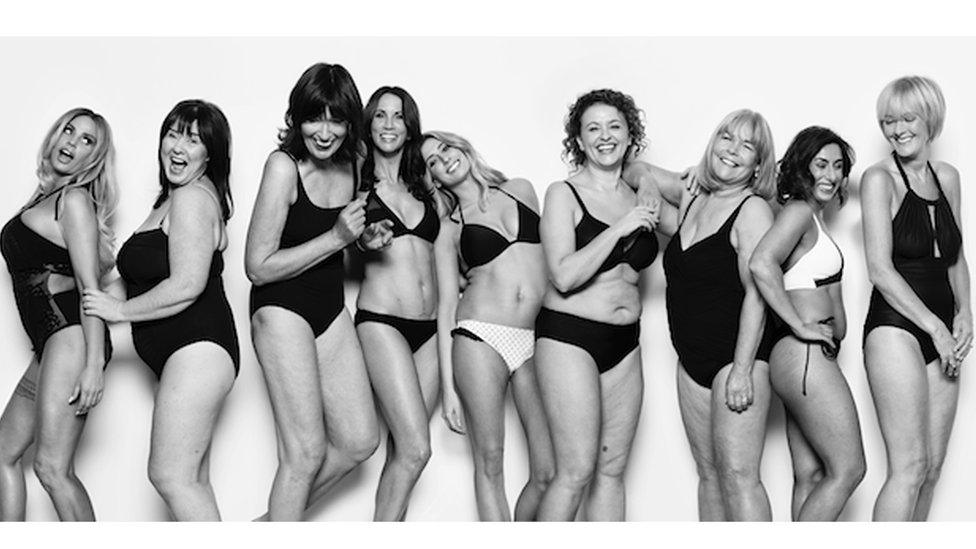
- Published15 November 2017
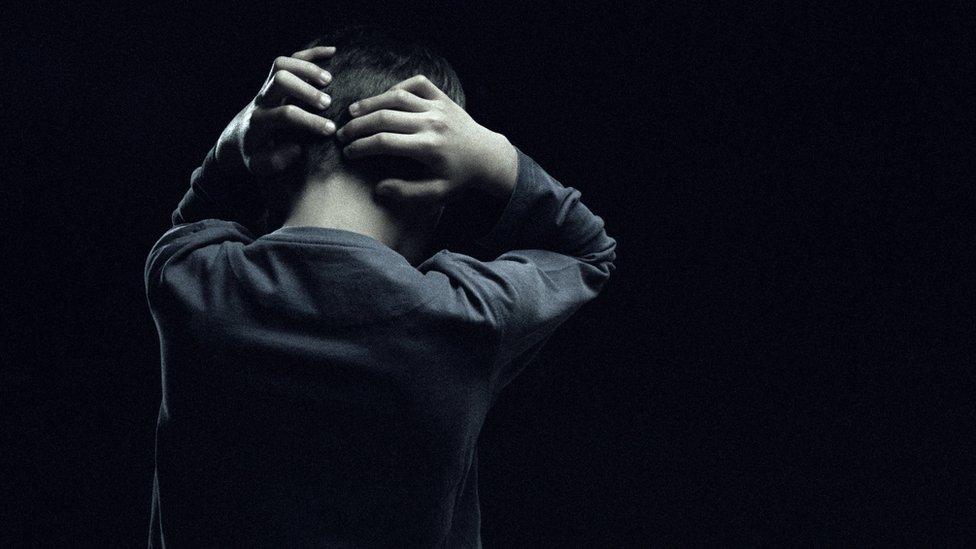
- Published22 June 2012
